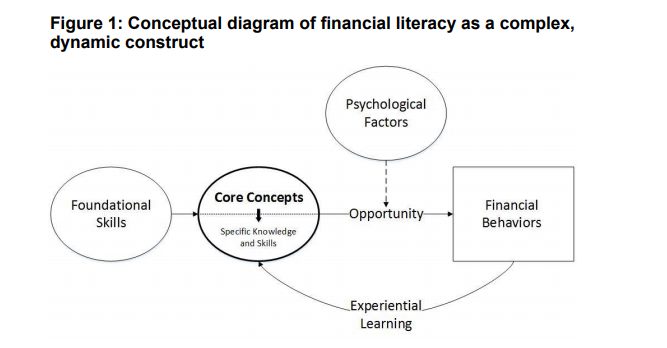Doing nothing about a problem seldom works.
Financial literacy programs have been under attack for years. Many question their effectiveness. Some say they hurt more than help.
The critics are wrong.
In our hearts, we always believed this to be true. Having data as an ally reinforces our beliefs.
Financial Education Affects Financial Knowledge And Downstream Behavior is a groundbreaking meta-analysis proving the value of financial literacy instruction.
The main finding:
Financial education in 76 randomized experiments with a total sample size of more than 160,000 individuals has positive causal treatment effects on financial knowledge and behaviors.
The paper further states treatment effects on financial literacy were very similar in magnitude to interventions in other subjects such as English and Math.
The positive impacts of this intervention didn’t show much difference between low-income individuals and the general population. It works for everyone.
There was no evidence of dramatic decay up to six months after the programs ended. The main component of critic’s arguments against implementing this type of instruction hedged upon the short term nature of education.
Topics showed varying degrees of success. Savings and budgeting displayed the most promise compared to other categories. Reductions in non-student debt and increased credit scores were other important by-products.
Another critical side effect of these programs is their positive influence on the instructors.
In addition to improving student outcomes, teachers’ financial literacy and credit scores also increased. The perfect win-win scenario In our travels to schools throughout New York, we always believed this to be true. There’s no better way to learn something than to teach it yourself.
Rescuing public school teachers from the horrible products in their 403(b) plans is a massive undertaking; financial education needs to be front and center.
Anyone with basic knowledge of finance would NEVER choose a variable annuity charging 3% or more to fund their retirement.
A big push into financial literacy wouldn’t only benefit students but eradicate the prehistoric way teachers currently save for retirement.
If you’re motivated by this convincing meta-analysis, there are numerous ways to find material to begin a program.
Starting with my friend Tim Ranzetta’s site, Next Gen Personal Finance. This free resource has everything you could ever need to start teaching, yourself, kids, and anybody else about personal finance.
The Council For Economic Education is another terrific free site for implementing a program.
There’s never been a better time to start educating people about money.
Mellody Hobson gets it.
You can go to high school in America today and take woodshop or auto and not a class on investing,” she told Khan Academy. “Who is whittling in their spare time? Who is clearing their carburetor?”
Yet understanding the basics of things that have a “profound potential effect on your long-term financial security” — like the Dow Jones Industrial Average, the S&P 500, and market capitalization— “we don’t teach it.”
Other club members include my friends Brian Portnoy, Tyrone Ross, Genti Cici, Phil Pearlman, and Dan Otter.
We’ve identified the problem.
Who else wants to be part of the solution?
You can read the full report here.






